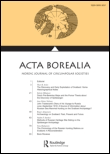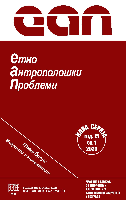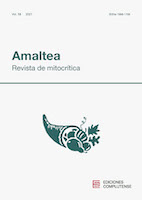
FOLKLORE
metrics 2024
Diving Deep into the World of Folklore
Introduction
FOLKLORE is a distinguished academic journal published by Routledge Journals, Taylor & Francis Ltd, concentrating on the rich tapestry of cultural expressions across time and context. With its ISSN 0015-587X and E-ISSN 1469-8315, this esteemed journal has been pivotal in the fields of Anthropology, Cultural Studies, and History, holding an impactful legacy since its inception in 1890. Currently ranking in the Q2 category in both Cultural Studies and History and Q3 in Anthropology, FOLKLORE is recognized for its significant contributions to the understanding of cultural phenomena and practices. Researchers and scholars will find this journal an invaluable resource, as it explores the intricate nuances of folklore, myth, and tradition with rigor and depth, catering to an audience keen on the interdisciplinary intersections of societal discourse. Although it is not an Open Access journal, it continues to foster critical discussions and extensive research on folklore, making it a vital platform for academic advancement in the humanities and social sciences.
Metrics 2024
 0.15
0.15 0.20
0.20 0.30
0.30 21
21Metrics History
Rank 2024
Scopus
JCI (Web Of Science)
Quartile History
Similar Journals

Architecture and Culture
Unveiling the Stories Behind Architectural SpacesArchitecture and Culture is an esteemed journal published by Routledge Journals, Taylor & Francis Ltd, focusing on the intersection of architecture, cultural studies, urbanism, and the visual and performing arts. Since its inception, this journal has become a vital platform for researchers, professionals, and students to explore the multifaceted relationship between architecture and cultural identity within contemporary contexts. With an ISSN of 2050-7828 and an E-ISSN of 2050-7836, the journal reaches a global audience from its base in the United Kingdom. Featuring a commendable Q2 ranking in Visual Arts and Performing Arts and a consistent presence in multiple relevant quartiles, including Q3 in both Architecture and Cultural Studies, it is well-regarded for its scholarly impact. The journal offers a unique opportunity for interdisciplinary dialogue, fostering innovative research that examines how built environments shape and are shaped by cultural narratives. This commitment to advancing knowledge in these fields is reflected in its ongoing publication from 2014 to 2024, making it a pivotal resource for those at the forefront of the discourse on architecture and culture.

FABULA
Exploring the Depths of Narrative and CultureFABULA is a distinguished academic journal published by WALTER DE GRUYTER GMBH, focused on the fields of Cultural Studies and Literature and Literary Theory. Since its inception in 1958, FABULA has contributed significantly to the discourse surrounding narrative theory, literary analysis, and cultural criticism, positioning itself as a vital platform for innovative research. With a Q2 ranking in Literature and Literary Theory and a Q3 ranking in Cultural Studies for 2023, the journal demonstrates its commitment to high-quality scholarship while fostering interdisciplinary dialogue among researchers and professionals. Although it currently does not offer Open Access options, its rigorous selection process ensures that published works meet the highest academic standards. Located in Berlin, Germany, FABULA remains a crucial resource for scholars seeking to deepen their understanding of the complexities inherent in narrative forms and their cultural implications, supporting ongoing research endeavors from 1964 through 2024.

OSTERREICHISCHE ZEITSCHRIFT FUR VOLKSKUNDE
Documenting the Tapestry of Austrian TraditionsOSTERREICHISCHE ZEITSCHRIFT FUR VOLKSKUNDE is a dedicated academic journal published by the VEREIN FUR VOLKSKUNDE that focuses on the interdisciplinary study of folklore and ethnology, particularly in the Austrian context. With a long-standing history of contributing to cultural studies, this journal serves as an essential resource for researchers, professionals, and students interested in the nuances of social practices, traditions, and cultural narratives. Although it has ceased its indexing in Scopus as of 2019, its impact is reflected in its rankings, particularly in the categories of Social Sciences and Arts and Humanities, making it a crucial reference point for those studying cultural phenomena. The journal, with ISSN 0029-9669, is based in Vienna, Austria, and offers a rich compendium of articles that promote scholarly discourse and broaden understanding in the field of Volkskunde. As it continues to foster academic dialogue, OSTERREICHISCHE ZEITSCHRIFT FUR VOLKSKUNDE remains a notable contributor to the evolution of cultural studies in the region and beyond.

Heranca-Revista de Historia Patrimonio e Cultura
Championing Interdisciplinary Dialogue on Cultural IdentityHerança - Revista de História, Patrimonio e Cultura is a distinguished academic journal published by Ponteditora in Portugal, dedicated to the exploration and preservation of history, heritage, and culture. Since its inception in 2018, this open-access journal has established a strong foothold in the academic community, becoming a valuable resource for researchers, professionals, and students alike. With an impressive presence in the Scopus rankings—ranking Q3 in multiple categories such as *Arts and Humanities (Miscellaneous)* and *Cultural Studies*—the journal demonstrates its commitment to advancing interdisciplinary dialogue and fostering innovation in the humanities. By offering unrestricted access to its rich array of scholarly articles, Herança plays a vital role in disseminating knowledge and promoting further research in the fields of history, museology, and the arts. With an aim to bridge theoretical insights and practical applications, this journal stands as an essential contributor to the cultural landscape and heritage studies, making it a pivotal platform for contemporary issues in our understanding of cultural identity and heritage conservation.

Acta Borealia
Bridging Disciplines for a Deeper Understanding of the NorthActa Borealia is a prestigious academic journal published by ROUTLEDGE JOURNALS, TAYLOR & FRANCIS LTD, based in the United Kingdom. Since its inception in 1984, the journal has established itself as a vital platform for scholarly discourse in the fields of Anthropology, Cultural Studies, History, Sociology, and Political Science. With a commendable impact factor and placement in Q1 and Q2 quartiles across various categories, it demonstrates a strong commitment to high-quality research and innovative contributions. The journal is well-ranked in Scopus metrics, highlighting its influence and reach within the arts and humanities as well as social sciences. Acta Borealia publishes original research articles, reviews, and critical essays, making it an essential resource for researchers, professionals, and students alike seeking to enhance their understanding of northern studies and related fields. While securing access may require institutional login or subscription, the journal's rich content continues to foster interdisciplinary discussions that are critical for navigating complex social issues.

Rusin
Navigating Complex Histories and Evolving LanguagesRusin is a distinguished academic journal published by ASSOC RUS in Moldova, playing a pivotal role in the multidisciplinary landscape of the humanities and social sciences. With an ISSN of 1857-2685 and an E-ISSN of 2345-1149, this journal has been circulating since 2011, amassing a significant reputation by 2023 as evidenced by its prestigious quartile rankings: Q2 in Anthropology, Q1 in History, Q2 in Linguistics and Language, Q1 in Literature and Literary Theory, and Q3 in Sociology and Political Science. The journal boasts remarkable Scopus rankings, including an impressive rank of #145 in Literature and Literary Theory, placing it in the 86th percentile among its peers. Although currently not open access, Rusin serves as an essential platform for researchers, professionals, and students, aiming to further the understanding of complex cultural and historical narratives, language evolution, and sociopolitical dynamics. As an informative resource, it fosters critical dialogue and interdisciplinary collaboration, solidifying its importance in the publishing realm within the humanities and social sciences.

Etnoantropoloski Problemi-Issues in Ethnology and Anthropology
Unveiling the complexities of human behavior and society.Etnoantropoloski Problemi-Issues in Ethnology and Anthropology, published by the University of Belgrade, Faculty of Philosophy, is a prestigious open-access journal dedicated to advancing the fields of ethnology and anthropology. With its ISSN 0353-1589 and E-ISSN 2334-8801, the journal has been a crucial platform since 2006, facilitating the dissemination of innovative research and critical discussions among scholars worldwide. As an open-access journal, it ensures that valuable insights and findings are readily accessible, promoting knowledge sharing and collaboration across the academic community. The journal aims to explore and address contemporary issues in cultural studies, social dynamics, and human behavior, emphasizing the relevance of ethnological and anthropological research in understanding our increasingly interconnected world. Researchers, professionals, and students alike will find Etnoantropoloski Problemi an essential resource for staying informed about the latest developments and debates within these dynamic disciplines.

Amaltea-Revista de MitocrItica
Bridging Literature and Culture for Global InsightsAmaltea-Revista de Mitocrítica is a reputable academic journal published by UNIV COMPLUTENSE MADRID, SERVICIO PUBLICACIONES, focusing on the fields of Cultural Studies and Literature and Literary Theory. Since its inception in 2008, this Open Access journal has been committed to fostering scholarly dialogue and enhancing accessibility to cutting-edge research within these dynamic fields. Based in Madrid, Spain, Amaltea provides an essential platform for researchers, professionals, and students interested in exploring the interplay between literature and culture, allowing them to disseminate their findings to a global audience. With a commendable positioning in the Q3 quartile across both related fields, as well as competitive rankings within Scopus, Amaltea stands as a significant contributor to contemporary academic discourse. Its dedication to high standards of publication ensures that emerging ideas as well as established scholarship are adequately represented and critically examined, making it a vital resource for those invested in the nuances of cultural and literary critiques.

Ethnologia Scandinavica
Navigating the Cultural Dynamics of the NorthEthnologia Scandinavica is a distinguished journal published by Swedish Science Press, dedicated to advancing the field of Scandinavian ethnology and cultural studies. With its ISSN 0348-9698, this journal has become an important platform for original research that explores the rich tapestry of cultural practices, traditions, and social dynamics within Scandinavian societies. Although not currently available through open access, the journal provides valuable insights that are often utilized by researchers, professionals, and students alike. Since its inception in 1984, Ethnologia Scandinavica has fostered scholarly discourse and serves as a crucial resource for those looking to deepen their understanding of ethnological perspectives in Scandinavia. Staying abreast of contemporary cultural issues and historical contexts, this journal plays an essential role in promoting academic inquiry and preserving the invaluable cultural heritage of the region.

Vestnik Slavianskikh Kultur-Bulletin of Slavic Cultures-Scientific and Informational Journal
Unveiling the Rich Tapestry of Slavic CulturesVestnik Slavianskikh Kultur-Bulletin of Slavic Cultures is a distinguished scientific and informational journal published by the State Academy of Slavic Culture. This journal, with ISSN 2073-9567, plays a pivotal role in the field of Slavic studies, providing a platform for the dissemination of cutting-edge research, cultural discourse, and scholarly analysis pertaining to Slavic cultures and civilizations. The journal aims to foster a deeper understanding of Slavic heritage, literature, and the societal dynamics shaping these cultures today. Although currently lacking an open access model, it remains an important resource for researchers, professionals, and students interested in the rich tapestry of Slavic traditions and contemporary cultural phenomena. With its thoughtful curation of articles, Vestnik Slavianskikh Kultur is poised to contribute significantly to ongoing scholarly conversations within the humanities.